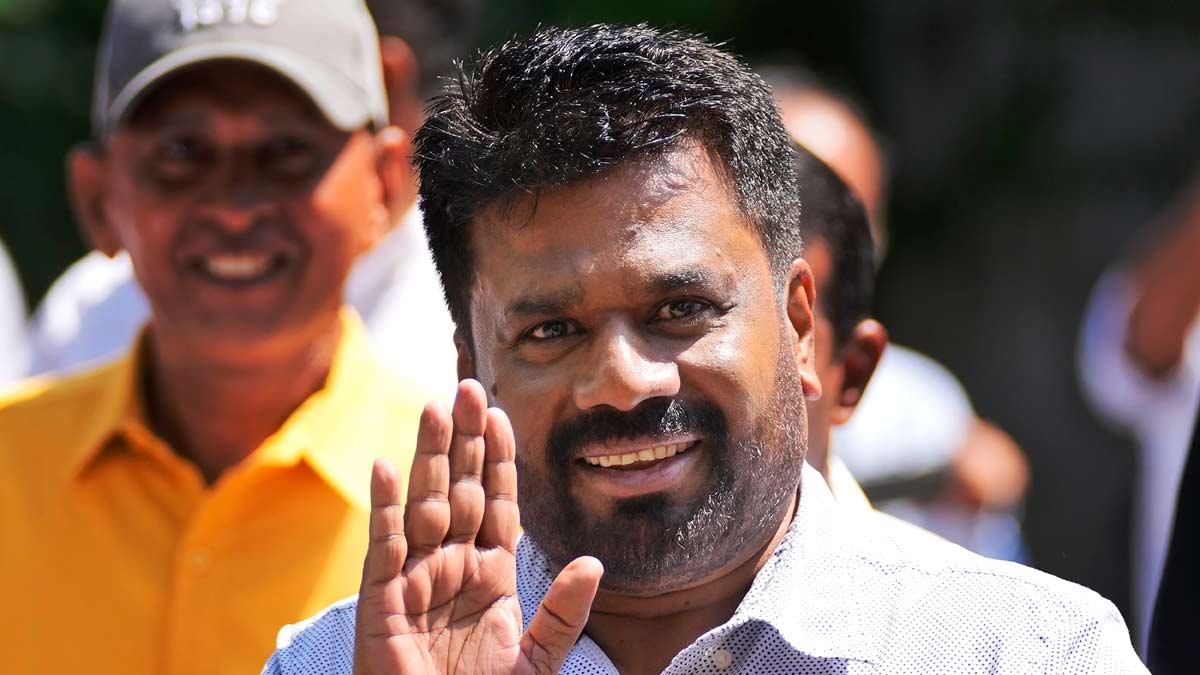Sri Lanka civic polls: Is NPP losing popularity among the people?
 National People's Power (NPP) candidate Anura Kumara Dissanayake arrives at a polling station to cast his vote in Colombo on Saturday | AP
National People's Power (NPP) candidate Anura Kumara Dissanayake arrives at a polling station to cast his vote in Colombo on Saturday | AP
Sri Lanka’s local civic polls, held on May 6, have thrown up several surprises, indicating a shift in ground reality. President Anura Kumara Dissanayaka’s ruling National People’s Power (NPP) - Janatha Vimukthi Peramuna (JVP) coalition witnessed a major dip in vote percentage.
Although the NPP emerged as the largest party, winning 265 out of the 339 local municipal councils across Sri Lanka, former president Mahinda Rajapaksa’s Sri Lanka Podujana Peramuna (SLPP) seems to be gaining traction.
The NPP’s vote share has dropped drastically from 61 per cent in the November 2024 Parliament general elections to 43 per cent in the civic polls. The 18% dip is attributed to the new government’s performance in the past six months. NPP’s loss in the prestigious Colombo Municipal Council comes as a deterrent for the ruling party.
The NPP, which suffered a loss of over two million votes in elections across the country—as compared to the Parliament general elections—is actually fighting hard to form an administration at the Colombo Municipal Council. However Anura’s NPP could win only 48 out of the 117 seats, which is far behind the majority numbers.
The opposition parties—Sajith Premadasa’s Samagi Jana Balawegaya (SJB) and Mahinda Rajapaksa’s SLPP—have secured 69 out of 117 seats, and are trying to unite and elect the Colombo mayor. The SJB has won 13 local governments.
There were 75,000 candidates in the fray from 49 parties and 257 independent groups. As elections to the local council were long due from 2022, voters did not want to choose mayors and their local leaders based on foreign policy or economic recovery, but rather based on who would deliver and attend to their local issues.
“The NPP had considerable leads in the presidential and parliamentary elections. Even now they have won the election. But the numbers have come down. When the opposition becomes a coalition their voting numbers are higher than the government polled. There are genuine concerns among the people about the new government delivering on grassroots needs, as they promised,” Omar Rajarathinam, founder of Factum (a foreign policy and tech think tank in Colombo), told THE WEEK.
As Omar indicates, several factors contributed to the NPP’s dip in vote percentage. Unlike once believed, the NPP is facing a huge challenge in taking the country towards an economic recovery, due to price rise and inflation. Apart from this are the council level political networks, which are purely candidate-based.
ALSO READ | Did Pahalgam terror suspects flee to Colombo? Sri Lankan cops search Bandaranaike airport for 6 people
Also, a dip in vote share indicates the ground shift to the SLPP. Having lost its political legitimacy due to mass protests in 2022, the SLPP is making a comeback under Namal Rajapaksa. Its resurgence is particularly pronounced in the rural South, which is dominated by Sinhala-Buddhist voters.
On the other hand, the performance of SJB continues to remain the second-largest, by scoring 32.8 per cent in the 2024 presidential election, 17.7 per cent in the 2024 parliamentary election, and 21.7 per cent in local civic polls.
A major contributor towards the shift in the political landscape in Sri Lanka's civic polls is strong performances put forth by regional parties in the North and the East.
Tamil nationalist parties like the Ilankai Tamil Arasu Katchi (ITAK) and the All Ceylon Tamil Congress have made a comeback, after losing ground to the NPP in the general elections. The ITAK has won 43 out of the 58 council seats it had contested.
Traditional parties such as the Sri Lanka Muslim Congress, the All Ceylon Muslim Congress and the Ceylon Workers’ Congress continue to remain unpopular among Muslim voters as well as hill country Tamils in Sri Lanka, which has also significantly influenced the voting pattern.
While the results do not indicate a wholesale rejection of the NPP, the key takeaway is that Anura’s popularity alone will eventually not be enough to save them.
World